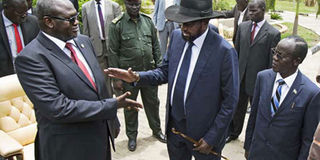Leaders’ bloated egos to blame for senseless killings in South Sudan

Front, left to right: South Sudan's First Vice-President Riek Machar, President Salva Kiir and Second Vice-President James Wani Igga at the Cabinet Affairs Ministry in Juba on April 29, 2016. PHOTO | ALBERT GONZALEZ FARRAN | AFP
What you need to know:
- Situation in South Sudan about the egos of two big men who have a disproportionate sense of entitlement.
- It is about rogue commanders who are used to having their way while totally disregarding international human rights laws and conventions.
- The latest conflict must end immediately and the delayed fifth anniversary celebrations should be used to rally the country together in a new resolve to fight poverty, disease and hopelessness.
- The people of South Sudan deserve better.
For the past few months, my colleagues and I at Amnesty International Kenya have been in what I would call the “rush-hour moment”, racing against the clock to ensure the human rights and dignity of refugee populations in Kenya are respected.
This came in the wake of a decision by the government of Kenya to repatriate all refugees at the Dadaab refugee camp back to Somalia. Working with many partners locally and internationally, we have made it clear that the Kenyan Government has no option but to respect international refugee law.
Just when our nerves were calming down following some positive developments on the government decision, news broke that a fresh, totally unwarranted war, had broken out in South Sudan.
More than 300 people had lost their lives, victims of a senseless ego-driven war. Among the dead were UN peacekeepers attacked by warring factions, right inside the UN compound.
South Sudan is Africa’s last-born. It holds a lot of promise in a continent plagued by conflict, bad governance and corruption. After two decades of conflict with its northern Arab compatriots there was a peaceful referendum for the south to leave in 2011 and the world heaved a sigh of relief.
A dark chapter had closed, giving way to a new dawn full of hope for all South Sudanese. War-weary and displaced by conflict, citizens held their breath for several moments as Africa’s newest flag was hoisted in Juba on July 9, 2011.
The anticlimax came too soon.
Around Christmas in 2013, President Salva Kiir accused his former deputy, Dr Riek Machar, of plotting a coup against him. Kiir’s soldiers, mainly from his Dinka ethnic group, moved to disarm troops from Machar’s Nuer ethnic group. Tens of thousands died in the ensuing conflict and many starved to death.
PEACE DEAL
In August, 2014, a new peace deal was signed in Addis Ababa. Dr Machar and his troops who had fled to the countryside returned to Juba where he took up his former post as first vice-president. Though Kiir reluctantly signed the deal, many hoped the new pact would hold. But there has been an uneasy calm in Juba, with both sides accusing the other of failure to stick to the terms of the peace deal. The latest fighting, therefore, came as no surprise.
There is no excuse or justification whatsoever for what is happening in South Sudan.
After five years of independence, the country should be focused on rebuilding itself, investing in education and healthcare, constructing roads, creating a competent and efficient civil service and building alliances with its neighbours.
Instead, it is in the grip of war and hunger, thousands remain displaced and the future looks dim for a people that once held so much promise.
South Sudan is a rich country, blessed with natural resources that many of its neighbours only dream about. Its oil production may have declined due to conflict but it still hovers around 160,000 barrels per day. Its oil reserves are some of the largest in Africa, only trailing Nigeria and Angola.
The conflict need not be about resources. The war is not about the people either. Who will President Kiir and Vice-President Machar rule over when citizens are dead, displaced, hungry and sick?
This is a war about the egos of two big men who have a disproportionate sense of entitlement. It is about rogue commanders who are used to having their way while totally disregarding international human rights laws and conventions.
The latest conflict must end immediately and the delayed fifth anniversary celebrations should be used to rally the country together in a new resolve to fight poverty, disease and hopelessness. The people of South Sudan deserve better.
Justus Nyang’aya is the country director for Amnesty International Kenya; [email protected].





